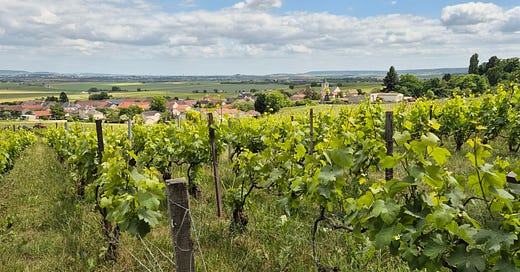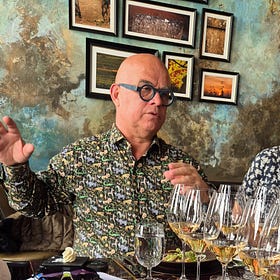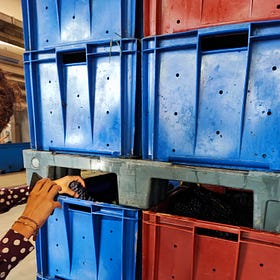I’ve just returned from a trip to the Petite Montagne de Reims in Champagne. Its most famous resident is arguably Jérôme Prevost of Champagne La Closerie in Gueux, known for startlingly vivid, vinous and now punishingly-expensive Meunier. Prévost is a superstar, and if you know the wines (and the importer), perhaps you buy them when you can. If you don’t know the wines, though, finding them for sale is almost impossible.
I didn’t visit Prevost for my Decanter article. In fact I didn’t even ask. Should I have? The question I often have in Champagne is how much time - if any - to dedicate to such rarified wines if most of my readers are going to struggle to actually drink them. I’m not quite sure what the answer is. Here, as I see it, are the arguments.
Vrigny in the Petite Montagne de Reims, looking over towards the ‘Grande Montagne’ (yes, that’s it - it’s not really a mountain!) towards the right and the city of Reims on the left
Yes Tom, you have to write about them!
These are legends of independent champagne, with stories to tell and track records
Your job is to cover the best wines - if they are impossible to find that’s not your concern!
Your job is to cover the best wines - if they’re ridiculously expensive that’s not your concern!
People like reading about unicorn wines, even if they can’t drink them
These wines still need critical attention (perhaps even more so given their prices)
It makes you feel important to visit these guys, and looks great on instagram
No Tom, spend your time uncovering more accessible wines
These producers already have plenty of attention - they don’t need any more, but there are great independent producers who do!
In fact, the anointed ones often not that interested in talking to journalists they don’t already know (and the UK isn’t a big market for them). They don’t have anything to gain - especially if you’re anything other than effusive.
It’s annoying for newcomers to Champagne to be led to think they have to find these wines to ‘get’ grower champagne
Covering them is more about proving you’re ‘in’ in champagne and getting some pageviews than actually providing useful coverage
What do you think? Leave a comment below if you have any thoughts.
Meanwhile, recently on Six Atmospheres for paid subscribers:
Some great independent champagnes you can still buy:
A user guide to recent vintages, and base vintages for NV, in Champagne
An unfiltered recent vintage guide to Champagne
A straightforward one for paid subs this week - some advice!
And a video post about the misleading world of bubbles!
Video - Bubbles Behaving Badly
Pour a glass of sparkling wine, and if you see a fine stream of delicate, small bubbles, it means it’s a high quality wine. Big chunky ones? Cheap fizz. Right?









Hi Tom,
First of all, I think the fact that you're asking the question already means you're halfway there.
I’d love to share a few thoughts, if I may:
To me, there are at least two kinds of unicorns in the wine world.
The first is the established unicorn — someone like Jérôme Prévost. There’s already a great deal written about him and La Closerie, so for a new piece to add value, I think it would need to offer real depth or a fresh angle. That said, something longer and more reflective from your hand would certainly be welcome. A brief tasting note, on the other hand, might not add much at this stage.
The second kind is the emerging unicorn — producers like Bastian Pontillart or Romain Henin, for example. Their wines are often seen on Instagram and are incredibly hard to find, yet very little is known about them. What are their philosophies? What can one expect from their wines? A thoughtful portrait could be fascinating. That said, this type of unicorn might be less suited to a publication like Decanter, depending on the editorial focus.
Thank you for raising the question — and for the work you do. It’s always a pleasure to follow your writing.
All the best,
Jp
Hi Tom - I hope you and yours are doing well today. If you are positing a choice between writing about great but inaccessible wines and delicious and accessible wines, I would encourage you to inform us about the wines we might buy. But if you have the time to taste and write about both categories, please do. I see the value in you having the knowledge of great benchmarks that you can then apply as you taste wines. In this way, you might be able to write in depth about an accessible producer making wines that approach the benchmark. The great, inaccessible wine will also become part of the catalog of information on which you can draw.